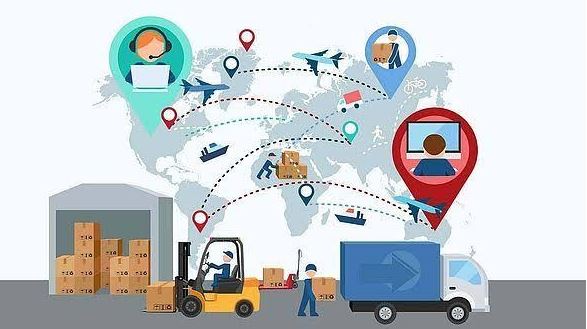Logistics is an integral part of the supply chain process. It is the movement of goods from the point of manufacture to the end of consumption. However, a supply chain is the management and coordination of efforts to move the logistics and associated information to the stakeholders in the best possible manner.
An efficient logistics management leads to reduced operating cost, reduced inventory requirements, and improved order to cash cycle. It also improves the supplier and vendor performance and optimizes the productivity of the organization. With the use of logistics management software for supply chain service solutions, you can augment the capability of your organization to streamline logistics operations.
There are multiple use cases of logistic management software. In the logistics industry, some of the common challenges which the vendors and suppliers face are management of transportation cost, inefficiency in the data management process, workforce management, driver shortage, and lack of inventory control and visibility. With logistics management software, it becomes easier to control the inbound and outbound transportation of goods, manage warehouse and fleet, process orders, control inventory, plan supply, and forecast the demands. To implement the right software for logistics management service, ask your vendor to provide a fully-featured and customized logistics tool that fits your business appropriately. The global logistics market is anticipated to register a CAGR of 3.48% from 2016 to 2022 to attain a market size of around $12,256 billion by 2022. Deploying the right software helps you to leverage your business as per the standards of the market.
Here are eight factors you need to consider to choose the best logistics software for your company.
Business Needs
With an extensive suite of logistic Software solutions available in the market, choosing the right tool that supports your business can be daunting. You need to carefully analyze your business needs to choose a suitable software that can cater to your logistics workflow. There are three types of logistics management software available in the market. These are Enterprise Resource Planning, Integrated SCM Suites, and Warehouse Management System.
Choosing software that integrates an ERP or enterprise resource planning system enables the team members to develop an integrated approach to plan business operations. It allows you to automate multiple functions for maintaining records, regulatory compliance, and IT services. SCM Suites provides a real-time analytical system to manage the flow and product information in the supply chain network. Warehouse Management System office visibility in the inventory and supply chain fulfillment process. Depending on your business needs, you can choose any of these tools or choose a hybrid framework for enhanced management.
Delivery Status Check
You can look for specific features in your software like status tracking tools to take care of all your order tracking needs. It can send you a shipping mail or a notification when the order is placed. It should allow the customers to track their shipments on an hourly/daily basis.
Scalability
Scalability is an essential requirement of logistics management software. As the capability of the business grows, it should be able to adapt and accommodate the increasing load. Scalable software is adaptable for the longer term as you can quickly expand or upgrade it on demand.
FTTQ-Based Logistics
Faster time to quote can speed up your logistics management process. While choosing a software solution, ensure that it allows you to maintain a database and automate freight quotations.
Generation Of Invoices
Automating the generation of invoices helps to minimize errors significantly as compared to operations that are done manually.
It helps to reduce the redundancy in the workflow, save time and associated costs, and adds a unique value proposition to the entire operation. Generating instant invoices adds value to service, and it simplifies the billing process.
Customer Support
Choose a logistics management software that integrates intelligent tools like AI and ML to stay relevant in the marketplace. You can also deploy AI-powered chatbots to provide 24/7 assistance to customers. A technologically advanced software incorporates tools like automation, chatbots, and virtual assistants that enable you to provide improved customer service.
Intuitive Software
While choosing logistics management software, ensure that it is easy to use. It should allow you to quickly onboard the employees without much hassle. You can choose software with a dashboard feature that the employees can easily use for quick access to various logistics data.
Cloud-Based Solution
If you can host your logistics software on the cloud, it allows you to reduce the infrastructural cost and improve team collaboration and efficiency. Moreover, it provides real-time visibility into different operations across different departments. Team members can access data stored on a centralized source from on-premises or remote servers by using d-based logistics software.
To Conclude:
You should look for these features in your logistics software to manage your logistics workflow quickly and efficiently. Customized software that integrates these features will allow you to manage highly complex and time-critical operations cost-effectively.
